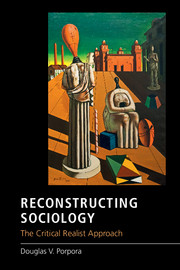Book contents
- Frontmatter
- Dedication
- Contents
- Acknowledgments
- 1 Seven myths of American sociology
- 2 Do realists run regressions?
- 3 What is truth?
- 4 Whatever happened to social structure?
- 5 Are we not men – or, rather, persons?
- 6 What and where is culture?
- 7 Do we need critical realism?
- 8 So what do we do with it?
- Bibliography
- Index
7 - Do we need critical realism?
Published online by Cambridge University Press: 05 April 2016
- Frontmatter
- Dedication
- Contents
- Acknowledgments
- 1 Seven myths of American sociology
- 2 Do realists run regressions?
- 3 What is truth?
- 4 Whatever happened to social structure?
- 5 Are we not men – or, rather, persons?
- 6 What and where is culture?
- 7 Do we need critical realism?
- 8 So what do we do with it?
- Bibliography
- Index
Summary
Again, please forgive the predictability. I am hardly going to answer this chapter's title question negatively. Clearly, I would not have brought you this far to conclude that we do not need CR after all.
The point of this chapter is to bring everything together, to see how CR compares in terms of similarities and differences with various other theoretical and philosophical positions in sociology. My hope is that even if you are un-persuaded by what I have said so far about CR, the discussion here will at least help you better navigate through the thicket of philosophical commitments across sociological perspectives.
I speak of philosophical commitments, and hopefully by this time it is clear we cannot escape them. We have them and they influence us, whether we recognize them or not. Such being the case, as we sociologists counsel others, so should we think critically ourselves. We should make sure that the positions to which we are philosophically committed are the those that are most defensible.
Although much good social science can still come from faulty philosophical premises, it will not be the best social science it could be. With faulty philosophical premises, moreover, much that might be potentially good social science will not even be entertained. Under the long dominant positivism, for example, ethnography has been devalued and discouraged. Under CR, it is not. So there is a pragmatic payoff here. Like the pragmatists, we in CR – or at least I – do not believe in philosophizing without practical point. However long our sojourn in philosophy may last, our work there should all ultimately relate back to some practical problem of life. In this case, the practical problem is how we best go about doing social science – and how, even more pertinently – we avoid practicing a sham discipline, one that looks like science but is not.
I promised that in this chapter there would be a handy chart, and there it is as Table 7.1. It will facilitate our task of examining similarities and differences across theoretical positions. First, I need to explain a bit what you are seeing, and the first thing to say is that the chart is sort of a mixed bag as it includes both theoretical and metatheoretical positions. The top four positions are philosophical metatheories; the bottom nine are more standard theoretical perspectives in sociology.
- Type
- Chapter
- Information
- Reconstructing SociologyThe Critical Realist Approach, pp. 188 - 208Publisher: Cambridge University PressPrint publication year: 2015



